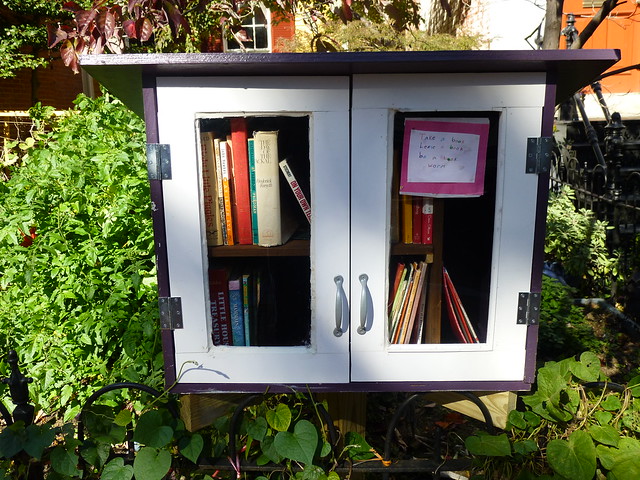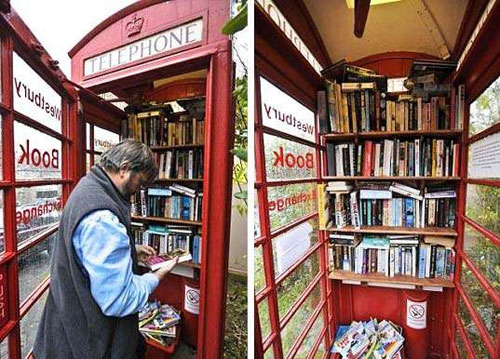 |
| The Cleveland Park Library, Washington, D.C. |
Perhaps library checkouts are handled differently nowadays, and maybe that stamped sheet at the back of the book was just a relic (resident librarian Rob -- help me here!). But regardless, the experience got me to thinking: What happens to all of those books that people stop checking out from libraries? Are they all sold at used books fairs? And what happens to purchased books when they have been read by everyone in the family? Do all of them sit around on private bookshelves forever? I, for example, keep every book I have purchased and was very happy when e-books came along -- I was almost out of shelving space. But what are the options for the non-hoarder?
 |
| A Micro Library in Capitol Hill, D.C. |
A newer take on this is the “micro library.” While it is sometimes difficult to trace the origins of new cultural waves one of the earliest organized deployments of micro libraries reportedly began in the U.K. From there the idea spread, including to the U.S. Here in Washington, D.C. you likely will not walk very far in any urban neighborhood without encountering a street-side micro library. These run the gamut from crude crates affixed to a post to carefully crafted dollhouse-like structures, each offering several shelves of books and a sign inviting passers-by to take a book and leave a book.
In New York City you may stumble upon something a bit more elegant. There a project that is the brain-child of urban architect John Locke involves the re-use of telephone booths, as he explained in a July, 2012 interview in World Literature Today.
 |
| Typical NYC Micro Library sharing a phone booth |
I was . . . drawn to the technological, and maybe even psychological, symmetry between physical books and phone booths. I think there is an innate feeling of loss toward both, in that one has already been rendered obsolete by a new technology—cellular phones—and the other is seemingly on the cusp of obsolescence as well, both through the proliferation of e-book readers and the general waning of literature as being part of the wider cultural discussion. And I think there is always a sense of hesitation, maybe even nostalgia, when something that once seemed so prominent and important begins to disappear.
Locke’s reaction to all of this, as shown in the picture, above, was to populate under utilized or even abandoned New York City phone booths with shelves of books. A similar approach has been used in England, where micro libraries have been established in iconic U.K. phonebooths. Once established, each micro library is largely free of supervision -- books are taken, books are left. Locke notes that each location predictably takes on characteristics of the community in which it is located -- the range of books that is available evolves and the overall character of the offerings changes in a manner that reflects the reading habits of the neighborhood.
 |
| A phone booth micro library in the U.K. |
While the micro library movement began as a sort of guerrilla “occupy the streets” approach to sharing books, as noted above it now has at least the semblance of order, with organized locations and world-wide location maps. If you are interested in sharing books but find that all of this is still a little too organized for your own guerrilla soul there is yet another avenue for each of us to send forth our books after we have read them.
Back in 2001 Ron Hornbaker, software business owner and book lover, came up with an idea to share books in a slightly less organized and more individual way. As explained in his BookCrossings.com website, his flash of genius was to send each book out on its own. Hornbaker’s idea was that it would be both useful and fun to surreptitiously abandon a book in a public place -- coffee shop, restaurant, bus stop, what-have-you -- and then sit back and watch what happens.
How does this work in practice? Well, first the book is registered in advance at the BookCrossings web site. This is a simple process, easily accomplished on a home computer. Once the book is registered the site assigns it an individual tracking number. Before “planting” the book for adoption, the owner affixes an identification tag like the following one: (available for download either for free or for a nominal price from the BookCrossing web site) prior to release.
Then the now former owner of the book sits back, relaxes, and waits to see how far the book goes. Each recipient, as explained on the identification tags, is encouraged to report in and, if all goes well, each book can then be traced on its travels through various owners on the BookCrossing web site using the individual assigned tracking number. How is all of this working so far, almost thirteen years later? According to the Bookcrossing website “[t]here are currently 2,263,401 BookCrossers and 10,021,193 books travelling throughout 132 countries. Our community is changing the world and touching lives one book at a time.”
That copy of Ellery Queen’s The Origin of Evil has been sitting sedately on the shelf of the Cleveland Park library for almost 40 years. I've got books some on my own shelves that have been there even longer. Think where they could have traveled!
Books set all of us free. There are some interesting ways that we can return that favor.
Books set all of us free. There are some interesting ways that we can return that favor.
Dale-
ReplyDeleteDid the book have a barcode? Probably on the front but possibly inside? That is probably how it being checked out. Much more efficient than the rubber stamps. They don't take off the paper slips because what purpose would it serve?
At the library where I work we have a bagel shop and there is a book swap shelf. I bring unwanted books and magazines there.
Dale, thanks for the info on books traveling 'round the world. I think I'll send one out.
ReplyDeleteMy favorite library as an undergrad was the McKissick Library on the USC campus. The atmosphere was comfortable over-stuffed chairs and dark wood. The only signs of books and references were wooden case card catalogs. Patrons checked out books by taking a slip of paper with the catalog number to a long desk and giving it to a worker who disappeared through doors behind the desk. Sometimes as much as half an hour passed before the requested item was at the desk to be checked out. I finally talked one of the workers into letting me through those doors to what he called "the stacks." Books books, books - floor to ceiling books several stories high with sliding ladders. I loved that place! USC has many different kinds of libraries and built a newer, more modern library with open shelves. McKissick became a museum where I've attended cocktail parties for exhibit openings, but I always think of the comfort of the place back when.
Good post, Dale. Happening into a library and finding a book you checked out thirty-five years earlier sounds like the beginning of an interesting mystery story. You could flip through the book and find. . .
ReplyDeleteDale, I think you must live in an alternate universe. In my New York City, I've never seen a micro library, and it's been years since I saw a phone booth. Also, here, books certainly do not remain on the shelves forever. My local library has frequent book sales, and with more and more readers switching to ordering their books online (conveniently delivered at whichever branch the reader requests), the shelves in my local branch are half empty. There is a mystery section, but there are usually only about two dozen books on it, most of them the same bestsellers you can find in airport bookstores.
ReplyDeleteOn the other hand, your experience could still happen in a university library. My husband, a keen history buff who works at a major university in Manhattan, checked out a volume of Sir Charles Oman's A History of the Art of War in the Middle Ages one day and found that not only had it never been checked out before since its acquisition in 1898, but he had to cut the pages in order to read it.
Rob -- I suspect that a barcode is, indeed, at play here. I need to wander back and check. As an aside, it would be obvious were I a character in a mystery story that it has been a long time since I used a library or I would know the answer to this without asking you!
ReplyDeleteFran -- Sounds like a description of the downtown St. Louis library, which I used to visit as a kid. Seemed to take forever for those books to be bought out!
Terrence -- Hmm. We should talk!
Liz -- Nope. We are in the same universe. Here is a site that collects the Micro Library locations in NYC that are registered with the Little Libraries project. http://archleague.org/main/wp-content/uploads/2013/04/LFL-map-1024.jpeg One suspects that there are likely a lot more sites that are out there doing it on their own without benefit of portfolio!
Interesting. I once dropped off a book at a microlibrary in Philadelphia, but couldn't carry anything else, so I didn't grab a book to replace the one I left. I should have gone back & checked to see whether it was still there.
ReplyDeleteI have a hard time parting with any of my books. But in the past when I ran out of shelf space, I would take old books to a used book store here in Knoxville and swap them for other used books. That store has since moved so far out from the city center that's difficult for me to get there. Now, I get to keep my books, storing them in boxes. I like the idea of the microlibrary, and if anyone ever starts one Knoxville, I'll be a customer.
ReplyDeleteLouis --
ReplyDeleteTry:
410 Maple Loop Road
Knoxville, Tennessee 37920
Brilliant concept, Dale. I love it.
ReplyDeleteThe Wichita Public Library has a used bookstore which includes library books they don't use anymore. I always like to see old books still on the shelves. In the mystery section they have a lot of the vintage Perry Mason novels---I always think "those were here when I was in here as a little kid!"
ReplyDelete